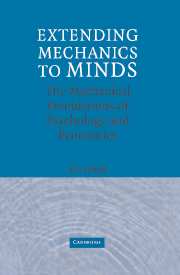Book contents
- Frontmatter
- Contents
- Preface
- Outline of the book
- Part I Reconciling Natural and Mental Philosophy
- Part II Reconstructing Rational Mechanics
- Part III Mechanical Minds
- Part IV The Metaphysics of Mechanics
- 15 Materialism
- 16 Reductionism
- 17 Effectiveness
- 18 Finitism
- Part V Conclusion of the Matter
- System of Notation
- Bibliography
- Index
17 - Effectiveness
from Part IV - The Metaphysics of Mechanics
Published online by Cambridge University Press: 21 September 2009
- Frontmatter
- Contents
- Preface
- Outline of the book
- Part I Reconciling Natural and Mental Philosophy
- Part II Reconstructing Rational Mechanics
- Part III Mechanical Minds
- Part IV The Metaphysics of Mechanics
- 15 Materialism
- 16 Reductionism
- 17 Effectiveness
- 18 Finitism
- Part V Conclusion of the Matter
- System of Notation
- Bibliography
- Index
Summary
As was noted earlier, the traditional conception of what we call mechanical computation or computation by machine relies on a purely kinematical conception of mechanics. It entirely omits any notion of force and focuses attention only on abstract states and motion between them. In this it follows a trend in mechanical formalism that moved away from considering forces and spatial motions to considering mainly Hamiltonian motion through abstract spaces, with no mention of either the central notion of force or the key notion of mass (cf. Hermann 1990, Sussman & Wisdom 2001).
This disconnect between mechanical computation and mechanics comes closest to being bridged in the related field of information theory, in which some authors have viewed information content as a type of mass measure (Manthey & Moret 1983) and have produced formal relations between information content and thermostatic theories of entropy (Chaitin 1975). These ropes tossed across the gap lack tether to the notion of force and still leave the crossing perilous.
Let us now reconsider the notion of computation from the mechanical point of view, to treat “mechanizability”—viewed in terms of machines—as mechanizability—viewed in terms of mechanics. We seek to understand the notion of effectiveness as involving not just abstract kinematics but also those fundamental concepts that distinguish mechanics from geometry, especially the concepts of rate of motion limited by limits on force and bounds on the rate of work.
Discussions in previous chapters have touched on these ideas already.
- Type
- Chapter
- Information
- Extending Mechanics to MindsThe Mechanical Foundations of Psychology and Economics, pp. 392 - 398Publisher: Cambridge University PressPrint publication year: 2006



